The Big Read: Team sports have not fully resumed amid Omicron surge and Singapore is all the poorer for it
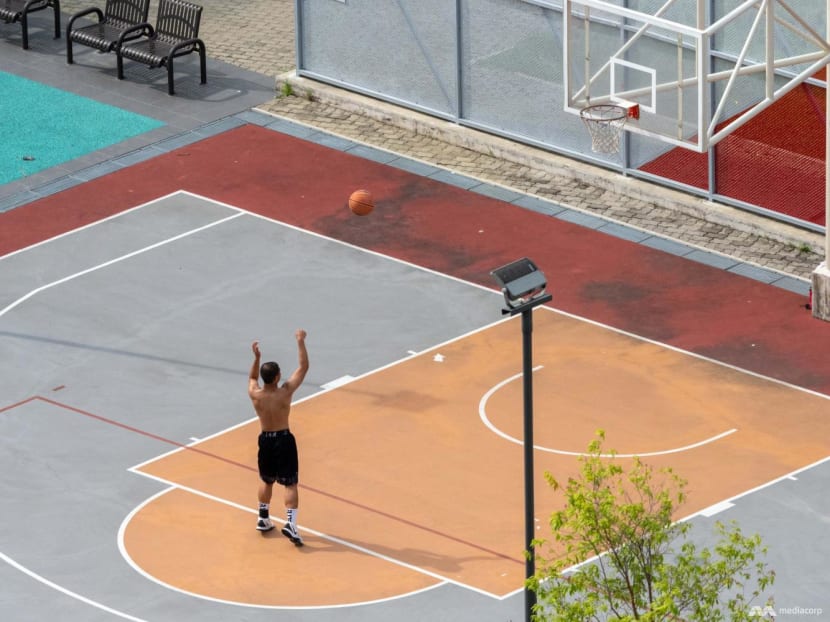
Strict safe distancing measures and group size limitations have affected many facets of life here, and team sports have not been spared. (Photo: TODAY/Lim Li Ting)
SINGAPORE: Football enthusiast Hatta Aziz used to play futsal with his friends regularly, which helped him to unwind after a long day.
Then COVID-19 struck in early 2020, forcing football and many other team sports into an indefinite time-out, as various restrictions to tame the pandemic, such as group size limitations and safe distancing, were imposed.
While the 35-year-old digital marketing consultant used to play futsal with his friends about two to three times a week, he has for the past two years been largely able to do only drills and workouts during football training sessions.
It was only in November last year - following the implementation of a pilot scheme allowing five-on-five gameplay for certain sports in some facilities - that Mr Hatta has been able to play a full futsal game with his friends. Even then, he has managed to do so only on a handful of occasions over the past months, given the limited number of booking slots for the facilities.
The training sessions and occasional games have helped Mr Hatta, who runs a football boots review website, to keep fit and remain engaged in the sport. But he still misses the close bonds he had forged playing regular football games with his friends.
“At the end of the day, we work very hard, and I think (football) is a stress reliever. There is the camaraderie with friends, even if you have a bad game, you can still talk nonsense and joke with them,” he said. “Once you lose those routines, it can be quite jarring.”
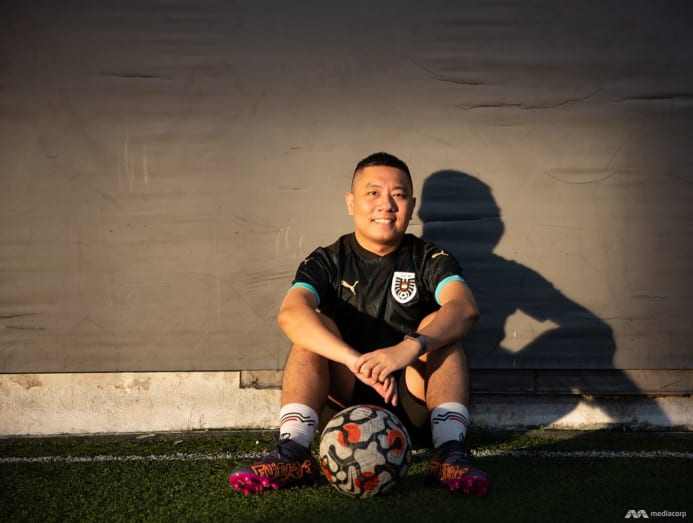
While having to miss out on their usual weekend games can be frustrating for adults, the pandemic-forced disruption to team sports can be much harder for children who are more physically active, especially for those whose daily routines once revolved around such activities.
Mr Jim Lim, 50, has had to find new pursuits for his 15-year-old daughter and 13-year-old son. The girl had been active in netball while her brother had been playing basketball before COVID-19 struck.
In 2019, his son, then in Primary 4, attended his school’s special sports programme, which trained him in both basketball and badminton once a week for eight months.
It was supposed to continue until he finished Primary 6 but COVID-19 put a halt to the programme.
In the absence of these team sports, Mr Lim has been accompanying his children on runs and cycling trips once or twice a week.
While these have kept them fit and active, the values his children learn from doing solo activities are not as rich as those learned in a team sport, said the senior manager at a cloud computing company.
“When participating in team sports, you learn leadership, (develop) camaraderie. Like when you’re playing football, it's not just attacking and moving with the ball, it’s teamwork - that (aspect) has suffered a little bit,” said Mr Lim.
Mr Lim added that his children have also lost various opportunities to make friends and form bonds through sports over the last two years.
“I think they’ve become more lonely, they don't get to see teammates and friends, and do things together,” he said.
Indeed, with the strict safe distancing measures and group size limitations affecting many facets of life here, team sports participation has taken a severe beating, said amateur players, coaches and sports associations here.
For a brief moment recently, team sports enthusiasts were cheered when it was announced on Feb 16 that from Friday (Feb 25), up to 30 fully vaccinated people can play sports together at approved facilities with no self-testing.
Then, just a day before the changes were due to kick in, there was a sudden announcement that they will be postponed to a date to be announced later, in part to the surge in Omicron coronavirus cases.
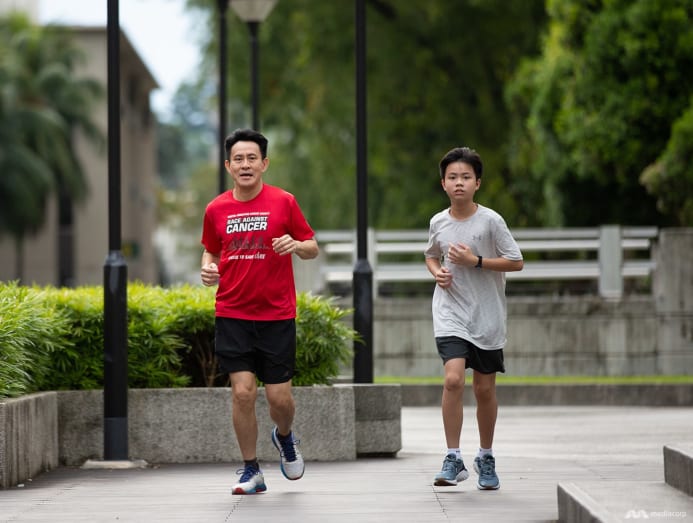
Though unavoidable, the prolonged disruption to team sports will have ramifications both within and beyond the sporting fraternity, such as affecting people’s mental well-being and the development of children’s social skills, said experts and sports practitioners.
While some, like Mr Hatta, are still finding ways to remain engaged in their favourite sport through training sessions, others have lost the motivation to pursue it.
Some coaches have also expressed concern that the talent pipelines for some team sports have been hit, due to a lack of recruitment of younger players over the past two years. This especially affects “up and coming” sports such as floorball and ultimate frisbee, as many children only pick up these activities in school.
Dr Lim Boon Leng, a psychiatrist at Gleneagles Medical Centre, noted that team sports have an important role in bringing people together.
Unlike other social activities, team sports have a relatively low barrier of entry, and participants are compelled to work towards a common goal, said Dr Lim.
“It’s very difficult to find another reason other than team sports to bring a large group of people together for a single purpose,” he said.
He added: “I think you can see this in other activities (in the arts) like maybe a string quartet, or an orchestra, but for those activities there’s a high barrier of entry. For team sports, sometimes you just need a ball.”
Stop-start curbs over past 2 years
Team sports participation first ground to a halt during the circuit breaker period from April to June 2020, when the public was advised to exercise at home or only with household members at parks and open spaces.
As COVID-19 cases fell, group sports resumed again in June 2020, when Singapore entered Phase 2 of its reopening after the partial lockdown.
Sports and recreation facilities were allowed to open with strict capacity limits, and group limits of no more than five people. This meant that team sports with a three-versus-three format and beyond could not resume yet.
From December 2020, when Singapore entered Phase 3, group size caps were increased to eight people, which meant that some team sports, such as four-versus-four basketball and futsal matches, and eight rowers per dragon boat, could be played again.
However, Singapore returned to stricter measures again in May last year due to the spread of the Delta variant. This led to the temporary closure of indoor sports facilities, while group activities were scaled back to a maximum of five people, and then to just two. This meant that team sports could not take place.
The same month also saw all indoor sports programmes and activities for those 18 years old and below suspended or moved online, while outdoor sports for this age group would be restricted to only one coach and one trainee.
While group size caps for sports activities were increased in June last year from two to five persons, this rule was again tightened a month later, back to a two-person limit, amid a further surge in COVID-19 cases.
In August last year, group size limits for sports were again relaxed to five, and team sports competitions and games could take place, but with only five persons on the field of play at any point in time. This lasted about a month, before the group size cap was yet again reduced to two persons.
There was light at the end of the tunnel in November last year: The cap was raised back to five and a new pilot scheme for team sports resumption was rolled out to allow up to 10 fully vaccinated persons to play a team sport together on the same pitch, as long as they are fully vaccinated and do a pre-event test prior to the game.
From Feb 1 this year, the vaccination-differentiated safe management measures have been expanded to cover all indoor sports facilities and all sport events irrespective of event size.
Then came the much-awaited announcement last week to allow groups of up to 30 people to take part in team sports, before it was abruptly put on hold.
SPORTS PARTICIPATION HIT BY RULE CHANGES
The slew of changes to permissible group sizes over the past two years has made the organisation of most team sports almost impossible, said players and coaches.
In response to queries, the Basketball Association of Singapore (BAS) said that participation rates for the sport have been “badly affected” across all levels due to the safe management measures imposed over the last two years.
Associate Professor Koh Koon Teck, who is BAS president, said: “We were in the group size of twos and fives most of the time … People were unable to play, practise and appreciate the sport, which minimally requires six people (for a three-versus-three format).”
He said that since late last year, Sport Singapore (SportSG) had given “special permission” to allow the national basketball team to train in a group of 10.
“Since then, we have been ramping up training frequency and seeking the help of Singapore Sport Institute in terms of fitness assessment to keep track of our players' conditioning, ensuring that they can still play at a high level,” he added.
SportSG did not respond to queries on community football participation rates over the past two years, especially among children and youths. SportSG runs the ActiveSG Football Academy, which trains children and youths aged between three and 16 years old.
For sports such as ultimate frisbee, there has been a sharp drop-out rate due to the lack of proper playing facilities, coupled with the lack of competitions over the last two years.
Ultimate frisbee player Tan Tyn Long, who is the training director at Thirsty Camels ultimate frisbee club, said that at the start of the pandemic, the players still tried to meet up online for workout and drills sessions. However, as the crisis dragged on, many quit.
While there were about 40 people in the club before COVID-19, only about 15 have been returning to training sessions lately.
“A lot of people have dropped out of the sport,” he said. “Some are driven by being able to compete, but now competitions are completely gone.”
While there was a period of time where eight people could gather and play four-versus-four games, currently they can only play two-versus-two games during training.
“With just five people, it’s frustrating as there’s only so many things you can do playing two versus two,” he said.
Ultimate frisbee is commonly played with five or seven players a side.
Mr Tan was also initially disappointed when the pilot scheme for team sports resumption did not include ultimate frisbee.
While ultimate frisbee is “definitely not as popular as soccer and basketball”, the sport had consistently attracted hundreds of participants at weekly games in various stadiums. It also did not require a lot of logistics, just an open field, a frisbee and cones.
However, as of late January, ultimate frisbee had been included in the revised list of eligible sports under the pilot scheme, alongside others such as football and netball.
For some team sports, the restrictions have also led some children to switch over to other sports which they see as more “convenient” to be involved in.
Some parents still have a niggling fear about vaccinating children aged 5 to 11. Listen to what experts and a parent have to say on CNA's Heart of the Matter:
Ms Evelyn Wu’s three daughters - aged five, 10 and 13 - used to play football. But due to the various measures imposed on the sport, the girls did not get to play a single football match in the past two years.
“They didn’t have an opportunity to play a match, as matches were all suspended, and that is the most crucial thing about team sports,” said the 43-year-old secondary school teacher.
So, Ms Wu decided to let her kids play basketball instead, where there were several competitions in a two-versus-two format that her eldest daughter could take part in.
While her daughters “still miss their football training”, she said that any form of sport would be beneficial for them during this period, where bad habits, such as excessive use of the Internet or even substance abuse, could develop.
“With team sports at least they learn teamwork, and that even if they cannot win, they shouldn’t throw a tantrum, it teaches them humility,” she said.
While some team sports can still be played with a smaller number of players, they are seeing higher drop-out rates among those seeking the full experience.
Mr John McAuliffe, a coach from basketball training academy SG Basketball, said that among the children whom he has been training since pre-COVID-19, about 15 to 20 per cent have stopped coming consistently or quit altogether.
While many of his younger students have stayed on to continue with skills training, the older children and teenagers tend to leave since they are unable to play matches.
“The older ones have learned their skills and they want to play games,” said Mr McAuliffe. “We do see some of them come occasionally (when restrictions ease), but they may disappear for several months when they’re not able to play.”
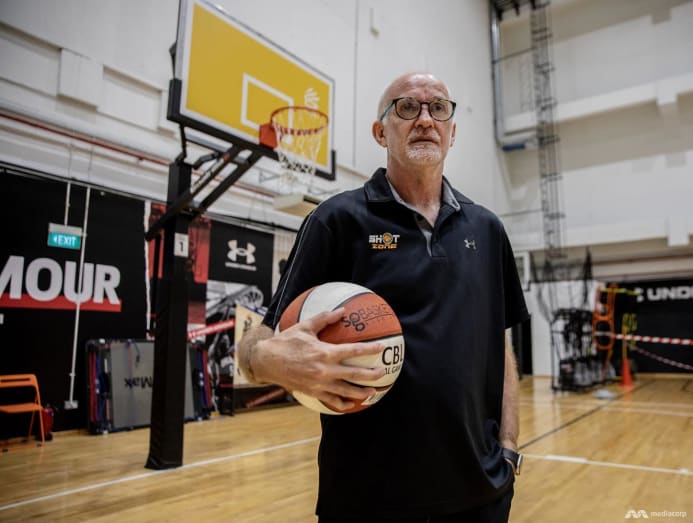
WIDER RAMIFICATIONS
The physical element aside, the sudden inability to participate in one’s favourite team sport constitutes a sudden loss of a coping mechanism for some people - and this may even affect their mental well-being, said some experts.
Dr Lim from Gleneagles Medical Centre said: “For some, their (coping mechanism) is very specifically team sports, to meet up on a Sunday with their friends for a game of football ... Having lost that, they lost a means to destress.”
Such a loss can lead to negative outcomes such as poorer quality of sleep, anxiety and even depression - symptoms which may be exacerbated by the already stressful context of a pandemic.
He added that the benefits of team sports actually “goes beyond the activity itself”.
“There is a lot of networking and interaction, there’s also the part where, for example, after the sport itself the group may go (for a meal) together, and there’s the camaraderie that you build, friends that you make,” he noted.
Agreeing, National University of Singapore (NUS) sociologist Tan Ern Ser said that what differentiates team sports from other social activities is that “team sports involve collaboration (and) cooperation in pursuit of common goals”.
“This can contribute towards developing a sense of belonging, identity, and community," said Associate Professor Tan. “In contrast, meeting up just for a chit-chat or to catch up - which does not involve doing things together for a common project and in pursuit of common goals reflecting common interests - may not provide the glue that could pull people together and sustain group life.”
For children, team sports help in their development and learning of social skills, said Dr Lim.
During the pandemic, he said, youths and children have become fixated with social media and online gaming, as physical and social interactions are being kept at a minimum.
“We assume that as children grow, they will be able to socialise and know how to react in social circumstances appropriately. But actually, a lot of these skills are learnt. I think children can really learn a lot from team sports," he said.
He added: “Without team sports and interacting with friends, their social development will be stunted, and sometimes you find that they’re not as able to form bonds well with friends, and they miss the opportunity to have long-lasting friendships."
According to sports venue operators, the demand for team sports is still going strong, with many raring to go as soon as the restrictions are eased and more games can be played.
Futsal facility The Cage operates football pitches and futsal courts in Kallang and Turf City. Its co-founder, Rajesh Mulani, said that calls were streaming in after last week's announcement that the group size restrictions for sports would be increased to 30 people.
“We got double to triple the number of calls that we normally get,” said Mr Rajesh. “We are starved of the game, completely starved of it.”
He added: “The reason why walking, running, cycling have exploded in popularity is because those are the options people are left with, but people who understand the camaraderie in team sports know that there’s nothing that quite comes close.”
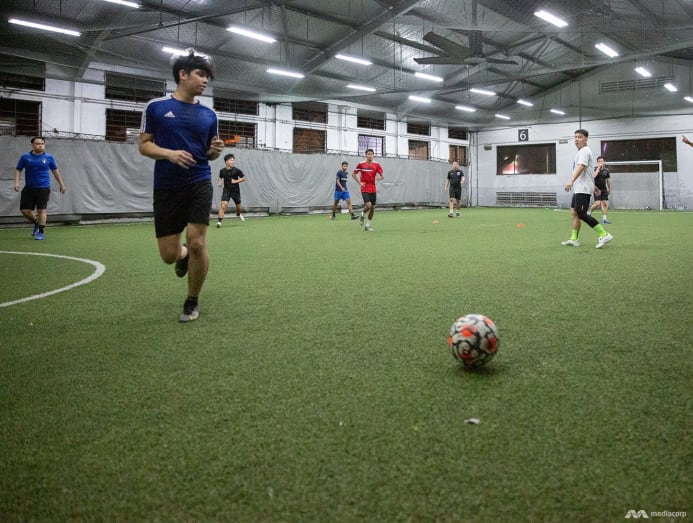
IMPACT ON TALENT PIPELINE
Apart from wider societal ramifications, the decline in team sports participation has also been detrimental to the development of young sporting talent in Singapore, said coaches and sports associations.
Mr Douglas Danapal, head of commercial, public relations and communications at the Singapore Rugby Union, said that many students who enrolled into junior college in 2020 had “not played a single match of rugby” in their entire two years there.
This would include students who had entered their respective institutions through the Direct School Admission scheme.
“The attrition rate has been very high, and many schools have slowed down their rugby CCA (co-curricular activity) or stopped it … games are not allowed, and competitions are not allowed,” he said.
Mr Danapal was afraid that due to the lack of game time, Singapore will be less competitive in the sport.
“We are one of the few countries in Southeast Asia that has yet to start full-contact rugby training for clubs,” he said.
Agreeing, Mr Kristian Thorbjornsen, founder of Big Blue Floorball School, said that floorball had been declining in popularity over the last two years due to the heightened restrictions.
Floorball became more well-known here after the Singapore men’s and women’s teams both won gold in the 2015 SEA Games, and the women's team again won gold four years later.
Mr Thorbjornsen said that over the past two years, his academy had lost about five to 10 per cent of its original student headcount.
He added that Singapore may fall further behind as countries around the world have already started training again, and its players are not getting sufficient game time.
“The Scandinavian countries, for example, have opened up (and started playing games) and are half a year ahead of us. Regionally, maybe it’s not so bad, but at an international level, the gap will widen,” he said.
Responding to queries, the Ministry of Education (MOE) acknowledged that the COVID-19 safe management measures "have indeed impacted the way CCAs, including team sports, are conducted".
Nevertheless, it said that schools "have adapted and modified their CCA sessions to minimise the disruptions caused by COVID-19, and to continue providing opportunities for students to be meaningfully engaged”.
Since November last year, secondary schools, junior colleges and the Millennia Institute have resumed full CCA sessions, the ministry added.
About 100 secondary schools, junior colleges and the Millennia Institute are also participating in the Team Sports pilot by MOE and the Ministry of Culture, Community and Youth. Under the pilot, about 10,000 students have been able to return to courts and fields as part of this pilot, playing sports such as basketball, floorball, football and netball.
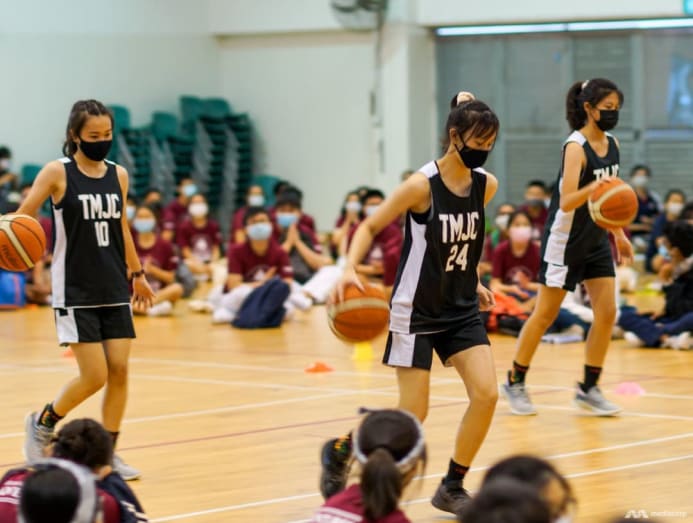
MOE added that CCAs have also resumed for primary schools since the start of the year, and that students have been training in groups of five.
“MOE is in-principle keen to extend the sports pilot to the primary schools, but we will need to closely monitor the Omicron situation before making a decision and will take into consideration the national safe management measures posture for sports activities,” the ministry said.
It also hopes to resume the National School Games, which have been suspended since 2020, in the coming months in “a safe and calibrated manner, subject to any changes in the COVID-19 situation”.
And while there has been a pause in the relaxation of the measures to a larger group of 30 participants, players and coaches still hope for the continual easing of restrictions.
Mr Lim, the father of two, said that he is encouraged by the announcement itself, and hopes his children can return to full-fledged team sports soon.
“These are good first steps … but currently, with the rate of infections going up … I think we still need to be very cautious.”
While Mr Rajesh, the co-founder of The Cage, was disappointed over the delay, he remained optimistic that the relaxation measures will eventually go ahead, after the current Omicron wave subsides.
Although his businesses revenue had fallen to as low as 20 per cent at the height of the pandemic and has now recovered slightly to 40 per cent, Mr Rajesh was determined that the reopening of his pitches be done in a safe manner.
“I don’t want to operate procedures where there’s no confidence at the country level (in how to cope with Omicron) … if that’s not there right now, we need a little more time, and it is far better for us to do it right than doing it recklessly.”
While the restrictions on team sports are set to be eased sooner rather than later, possibly leading to full resumption eventually, the requirement for participants to be fully vaccinated is expected to remain in place for team sports as well as for competitive sports at all levels.
Some parents interviewed expressed concern over the vaccination-differentiated measures and how they may potentially affect their child’s chance of participating in a sport.
A woman, whose 11-year-old daughter is a competitive swimmer, said she was afraid that the girl’s unvaccinated status would disqualify her from competitions in the future.
The mother, who declined to be named, had chosen to not get her daughter vaccinated due to concerns of possible side effects.
Mr James Chan, a 48-year-old father of four, was also concerned about the vaccination requirement for children to take part in team sports or competitive sports. The real estate agent's children are aged three, five, seven and nine. The two oldest children are fully vaccinated.
He felt that children should not be held accountable for their vaccination status as it is the parents who ultimately give consent or even decide if they want their children vaccinated.
“Other kids in their class may be vaccinated and playing in their groups, but then that (unvaccinated) kid is singled out and left in the corner … It’s not good for the child (to be) left out and stigmatised,” he said.
The authorities have repeatedly stressed the importance of getting children vaccinated against COVID-19, in order to protect them against the risk of severe illness should they get infected.
Earlier this month, Health Minister Ong Ye Kung said that among all age brackets, children and young people are the two groups with the highest COVID-19 infection rates.
This story was originally published in TODAY.


















